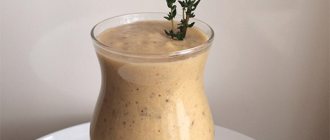Features of a newborn's stool
In the first months, the baby’s intestines do not always do their job well. It takes time for him to adapt to new conditions. Color, consistency, smell, frequency of bowel movements often raise doubts among parents.
Pediatricians say that formula milk suitable for a baby is well absorbed, leaving a minimum of waste in the form of feces. The process of bowel cleansing changes as the child ages.
Features of stool in the first month of life. The first stool in newborns is dark in color, odorless, jelly-like, called meconium. This is how the contents of amniotic fluid, which the baby swallowed in utero, are released. A one-month-old baby has frequent bowel movements, up to 10 times a day. An “artificial” baby, unlike a “breastfed” baby, has denser feces with a pungent odor.
Features of stool from the second month. As your baby grows, he poops less often. In a two-month-old artificial baby, the process of emptying occurs up to 3 times a day. With an increase in the volume of incoming food, the weight of feces increases, and the consistency changes into a thick paste.
An “artificial” child and a “breastfed” child are already an individual. For one person, the norm is to poop once every three hours, for another, once every three days. The stool should be regular, without pain.
Mixtures with symbiotics or combiotics for constipation
Research suggests that infant formula should contain both probiotics and prebiotics. This is explained by the fact that they:
- improve digestion;
- restore intestinal microflora;
- help strengthen the immune system.
Mixtures containing pre- and probiotics are called combiotic or symbiotic. Symbiotics are pro- and prebiotics that enhance each other’s effects.
The list of combiotic mixtures includes:
- Agusha gold;
- Hipp Combiotic;
- Similak premium.
Causes of constipation
Artificial nutrition, unlike breast milk, has a larger amount of fatty acids and various additives. The undeveloped intestines of a newborn find it difficult to cope with them. Therefore, a bottle-fed baby is more susceptible to constipation. Sometimes the cause of constipation is not related to the baby's diet. Let's consider possible factors that provoke fecal retention.
Wrong nutrition
The health and development of the child’s body depends on the formula that the baby consumes. You cannot save on baby food; good formula cannot be cheap. Buy this product only in pharmacies or special children's stores. When choosing, be guided by the age of the child, carefully study the packaging. Below is the main classification of mixtures:
- Highly adapted mixtures - the composition is most similar to breast milk, consists of whey and a number of bioactive substances. Suitable option for newborns.
- Mixtures of small adaptation - the composition has increased the protein content characteristic of cow's milk.
- Partial adaptation mixtures do not have biologically active additives. Suitable for older children.
- Fermented milk mixtures - bacterial enzymes are added to the composition. They are used in addition to the main food.
- Special purpose mixtures are therapeutic and prophylactic, can be used from birth. Prescribed by doctors for children with digestive problems, lactase deficiency, anemia, and allergies.
Dietary changes
When the formula is changed, the baby's stools usually change. The color, smell, consistency may change, and feces may be retained. Constipation that occurs when switching to a new diet is false. After the body adapts, it goes away. It is necessary to transfer newborns to a new formula gradually, over the course of a week, adding small portions to the baby’s regular feeding. The mixture should be changed only when absolutely necessary!
Drinking regime
Pediatricians recommend offering the baby clean water, “raisin water,” or prune decoction after the formula. Thick stool indicates a lack of fluid in the body. The amount of water you drink per day should be 30 g per kg. weight.
Dysbacteriosis
Constipation in a newborn can occur due to dysbacteriosis. Up to 95% of children under one year old experience this imbalance of healthy intestinal microflora. Many doctors do not consider dysbiosis a disease. The body gradually improves its microflora on its own. Some pediatricians prescribe treatment with prebiotics and probiotics.
How to help your child
All the methods for eliminating constipation described above help to temporarily relieve the baby’s condition, but behind the external problem there are more serious reasons that cause irregular bowel movements. If they are not corrected, the problem will appear again.
If you notice signs of constipation in your baby, you should consult a doctor. The specialist will examine the baby and prescribe tests that will determine the cause of the rare bowel movements.
There are several methods that can be used by parents of a bottle-fed child to alleviate his condition.
- Diet, correct choice of mixture.
Be sure to pay attention to the labeling on the box of formula. Adapted nutrition for a newborn child should be marked “1” and indicate the child’s age (from 0 to 6, from 0 to 12). Feeding a newborn artificial baby should be done strictly according to the clock (at the same time every time). A single serving for a child 1-4 days – 20-60 ml, 1-2 weeks – 50-90 ml (no more than 20% of body weight per day), 1 month – 100-110 ml. It is not recommended to exceed this amount, since overeating is fraught with excess weight gain and problems with the digestive system. Formula milk is “heavier” than mother’s milk and takes longer to digest, so it is important to take breaks between feedings (at least 3 hours). - Laying on the tummy.
This position improves bowel function, promotes the passage of gases, and reduces the likelihood of constipation. - Massage.
The baby does not need a professional massage therapist. Every mother can master simple techniques. You need to stroke (lightly pressing) the baby's tummy clockwise. This will improve his digestion. You can also do a little gymnastics, first pressing the baby’s knees alternately to the tummy, then together. - Water.
Artificial babies need water in their diet, since formula milk causes thirst. You need to give your baby water in between feedings. Sometimes a bottle of water becomes a real lifesaver for parents of a bottle-fed baby, since not every child can withstand a 3-hour break between feedings. Water helps not to overfeed the child and helps him build a diet. - Preparations containing beneficial bacteria.
Constipation is often caused by an imbalance of good and bad bacteria in the intestines (dysbiosis). You can “see” the problem with a laboratory examination of the baby’s stool. Be careful about medications. They must be prescribed by a doctor!
Irregular bowel movements in a bottle-fed baby is a very common problem and well known to doctors. If tummy tucks, water, and massage don’t help, consult a specialist.
Methods and remedies against constipation
In most cases, constipation in infants does not require treatment. It is recommended to keep the situation under control and closely monitor the child’s well-being.
Many parents begin to panic, quickly change one mixture to another, and try folk remedies, grandma’s, on their child. Such actions can worsen the child’s condition. Knowing the methods and means of treating constipation, the problem can be safely solved.
Independent safe actions
A parent can help the baby cope with the illness. The main thing is not to worry, the excitement will transfer to the child and provoke screams and tears. You need to do the following with confidence and caution:
- Tummy massage. Without touching the navel, place the thumb of your right hand below the navel, and gently rotate the remaining fingers clockwise. You can't put pressure on your stomach. Massage with a warm hand.
- Planting above a container. 10 minutes after feeding, press the baby’s knees to the tummy, and thus place him over the container. Staying in this position promotes the functioning of the intestinal tract. The procedure is carried out daily, preferably at the same time.
- Leg exercises. Place the baby on his back, bend and straighten his knees one by one, gently pressing the thigh to the tummy. Repeat 5-10 times. Then do this exercise, bending two legs at the same time.
- Laying on the tummy. Turn the baby onto his stomach (preferably on a hard surface), stroke his back with light pressure.
Laxative medications
The most common laxative for constipation is lactulose syrup. Sold in pharmacies under different commercial names (Duphalac, Normaze, Goodluck). It is considered a harmless substance and is not addictive. The dosage must be prescribed by a doctor.
Glycerin suppositories and microenemas
Glycerin suppositories are used as a last resort and can cause itching and irritation to the child’s skin. Use no more than one candle per day. The effect is achieved within an hour.
A safe modern option for combating constipation is Microlax small enemas. The prepared solution is injected into the anus to the depth of half the tip (indicated by a special mark), within 10-15 minutes the problem of constipation will be eliminated. The solution acts only on dense feces and does not affect the organs of the digestive system, unlike other medicinal methods of treating constipation.
Folk remedies
Some people consider the medical approach unsafe and use “grandmother’s recipes.” Many methods have been tried for centuries and give positive results.
The main condition when using folk remedies is not to go to extremes and think about the safety of the baby.
Let's consider popular methods of traditional medicine:
- Dill water. A newborn should be given dill water before and after each feeding in the amount of two teaspoons. The recipe is quite simple: add one teaspoon of dill seeds to a glass of water, simmer over low heat for three minutes, and let it brew. Then strain.
- Honey. Considered a natural mild laxative. Dip the pacifier in honey and give it to the baby. In addition to its laxative effect, it promotes sound, healthy sleep for the baby. Honey is a strong allergen, use with caution.
- Anal irritation. Gently insert a cotton swab lubricated with glycerin into the baby’s anus, then twist. Instead of a stick, a gas outlet tube will do. Sometimes a thin bar of soap is used, but recent research shows that this is harmful to the baby's health. Pediatricians do not recommend this method.
https://youtu.be/rySHbYPjkz0
Special mixtures against constipation
Special mixtures contain prebiotics and probiotics, as well as a low percentage of protein. This promotes more active digestion and rapid removal of nutrition from the body. Some mixtures contain lactulose. It has a laxative effect and multiplies bifidobacteria, which lead to a natural improvement in intestinal motility.
Fermented milk mixtures are added to the main diet. The mixtures populate the intestinal microflora with live bacteria, adjusting its functioning.
Preventive mixtures for constipation with prebiotics
The prophylactic mixture for constipation contains prebiotics. It should be used for feeding healthy infants and those babies who suffer from problems with stool from the first days of life. The following products are considered the most effective:
- Nanny with prebiotics;
- Similac;
- Nestozhen Preben;
- Agusha Gold;
- Hipp Combiotic;
- Humana with prebiotics.
Prebiotic components in infant formulas
Experts emphasize that infant formula to combat colic and constipation should contain prebiotics - dietary fiber, polysaccharides:
- fructooligosaccharides;
- galactooligosaccharides;
- inulin;
- lactulose.
They are selected individually for each child. Polysaccharides enter the large intestine, stimulate its function and the growth of lacto- and bifidobacteria. Research suggests that prebiotic supplements are the best option for constipation relief.
On each package of the mixture, manufacturers indicate information about the amount of prebiotic it contains. The higher this indicator, the more effective the product will be.
Prebiotics:
- do not require special storage conditions;
- are not digested in the upper parts of the digestive tract;
- stimulate the process of growth and reproduction of their own intestinal microflora.
Preventing constipation
To avoid constipation in a formula-fed newborn, follow the rules recommended by doctors:
- Choose your mixture carefully.
- Try to stick to one mixture, do not switch to new ones.
- Maintain drinking regime.
- Regularly do recommended physical exercises for your child.
- Place on tummy.
If, following these rules, parents still encounter the problem of constipation, then first of all contact your doctor, who will offer competent treatment.
How to understand that the mixture is not suitable?
Nutritional admixtures contain twice as much protein as breastfeeding mother's milk. However, they do not contain oligosaccharides that newborns need. It is because of this that food begins to move three times slower through the gastrointestinal tract of babies. This causes the problem of irregular bowel movements and other side effects in children, which include:
- frequent regurgitation;
- allergic reactions;
- bloating;
- pain in the lower abdomen.
After such symptoms appear, we can conclude that the nutritional impurities are not suitable for the baby and something needs to be done about it. Medicinal mixtures are used to treat abnormal stools and eliminate symptoms.
Types of mixtures
Having understood the causes of colic, you should understand the types of mixtures. There are two main classifications of medicinal impurities that will help get rid of colic and constipation.
By purpose
According to their intended purpose, it is customary to distinguish only two types of mixed solutions:
- Medicinal. They are prescribed for newborns with constipation that continuously lasts more than 10–15 days. They are considered the most effective and are therefore used only if other treatment methods have not helped to cope with the problem.
- Preventive. Prescribed to children who are prone to hereditary constipation. Also, preventive formulas are used as a safety net when a child often has digestive problems. Such liquids improve the absorption of beneficial components, stabilize the functioning of the stomach and improve metabolism. Parents should make the decision to use preventive formulas only after prior consultation with their doctor. Self-administration of such liquid can negatively affect the baby’s health.
By consistency
The second common classification of mixtures is division according to consistency features. In this case, infant formula is divided into three types:
- Dry. Such compositions for constipation and colic are made in the form of a powder, packaged in small bags or boxes. Dry powders have a long shelf life, and therefore the prepared mixture can be stored for 2-3 weeks. Before using dry powder, it must be diluted with water, following the instructions on the package.
- Liquid. Diluted with warm water in a one to one ratio. The disadvantage of liquid formulations is their short shelf life.
- Ready. This formula for newborns is often used if you have to take the baby on a long trip, when there is no time to independently prepare nutritional fluids. Before using this formula on your newborn, you will need to warm it up in advance so that it is not cold.
The need to eliminate constipation in a newborn
First, let's define what constipation is? Constipation is difficult, irregular, untimely or incomplete bowel movements.
If an adult does not have regular bowel movements, treatment is, of course, required. What about babies? Should you always worry?
If a child is breastfed or eats high-quality formula and feels well, gains weight, grows and develops, then he has the right to any appearance, color, frequency and consistency of bowel movements.
When breastfeeding, milk is completely absorbed and stool can be done once every two days. Let us repeat: if the child feels well, there is no reason to worry.
If a child is constipated and is restless, eats poorly, or feels unwell, we take action!
If your baby has constant problems with bowel movements, do not self-medicate; be sure to consult a doctor to make sure there are no serious reasons for concern.
In children of the first year of life, Hirschsprung's disease can become a serious and dangerous cause of constipation. Fortunately, it does not occur very often (one case per 2-5 thousand newborns).











